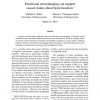Free Online Productivity Tools
i2Speak
i2Symbol
i2OCR
iTex2Img
iWeb2Print
iWeb2Shot
i2Type
iPdf2Split
iPdf2Merge
i2Bopomofo
i2Arabic
i2Style
i2Image
i2PDF
iLatex2Rtf
Sci2ools
133
click to vote
JOCN
2010
2010
Functional Neuroimaging Can Support Causal Claims about Brain Function
Cognitive neuroscientists habitually deny that functional neuroimaging can furnish causal information about the relationship between brain events and behavior. However, imaging studies do provide causal information about those relationships--though not causal certainty. Although popular portrayals of functional neuroimaging tend to attribute too much inferential power to the technique, we should restrain ourselves from ascribing it too little. It is a healthy truism that secure inference in cognitive neuroscience requires converging methods. The brain is enormously complex, and vital knowledge about it has arisen at vastly different spatial and temporal scales, through observational methods as well as natural and engineered interventions. In light of the field's distinguished origins in lesion studies and singleunit neurophysiology, functional neuroimaging is too readily ceded pride of place in the canon of cognitive neuroscience methods--but that does not license its critics or ...
Causal | Causal Information | Et Al | JOCN 2010 |
Related Content
| Added | 19 May 2011 |
| Updated | 19 May 2011 |
| Type | Journal |
| Year | 2010 |
| Where | JOCN |
| Authors | Matthew J. Weber, Sharon L. Thompson-Schill |
Comments (0)

